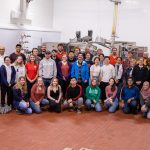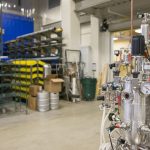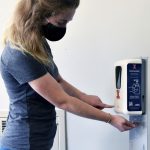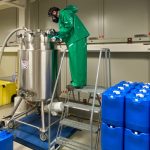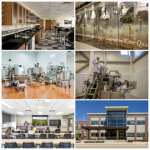URBANA, Ill. – Four years in, the Integrated Bioprocessing Research Laboratory (IBRL) continues to grow rapidly by providing world-class pilot plant services to the food and bioprocessing industries. Since IBRL’s October 2018 grand opening ceremony, 60 clients have completed over 400 projects, including several who have now successfully launched products to market. An additional $6.5 million in state funds for equipment and expansion of IBRL staff has enabled these client projects and successes.
IBRL’s clients include some of the hottest names in food and industrial biotech, including venture-funded and multinational companies. Clients represent growing industries, such as alternative protein for food and cosmetics, high-value compounds, low-caloric sugars, beverages, commodity fractionation, energy, biofuels, and many others. They appreciate IBRL’s quick adaptation to their changing processes during the R&D phases, as well as data management and equipment vendor relationships when they are ready to scale their processes to commercial production.
As part of the Department of Agricultural and Biological Engineering in the College of Agricultural, Consumer and Environmental Sciences and The Grainger College of Engineering at the University of Illinois, IBRL continues to play a critical role in supporting academic researchers with their federal grants.
Recently, IBRL hosted the United States Secretary of Energy Jennifer Granholm to discuss converting biomass into the building blocks of commercially valuable products. This visit was closely related to IBRL’s pivotal scale-up role in the $115 million Center for Advanced Bioenergy and Bioproducts Innovation (CABBI) grant, the largest to date on the U of I campus, funded by the U.S. Department of Energy. IBRL is also a member of BioMADE, the U.S. Department of Defense’s Bioindustrial Manufacturing Innovation Institute, helping advance bioindustrial manufacturing in the United States. IBRL is a critical partner in the University of Illinois-led project “New Technologies for Industrial Production of Succinic Acid,” awarded during the first BioMADE project call.
Strong partnerships with bioprocessing equipment vendors allowed IBRL to install over $15 million worth of equipment, including donations from industry sponsors. Notable recent additions include expanding the fermentation suite to ten fermenters; increasing Alfa-Laval solid-liquid separation capabilities; completing the Buhler twin-screw extrusion line; and adding a Pro-Sonix jet cooker, a GEA falling-film evaporator; and alcoholic beverage equipment, including brewing and distillation capabilities. IBRL also finished outfitting its unique explosion-proof volatile extraction room with reactors ranging from 1 to 900 liters.
To support client demands and additional equipment operations, IBRL has significantly expanded staff over the past eight months. Under direction of Executive Director Vijay Singh, IBRL has promoted Brian Jacobson (strategic operations) and Beth Conerty (business development) to the associate director level of the management team. Pilot Plant specialists Eric Wolfe and Phillip Manning have been promoted to the senior specialist role and have been joined by specialists Kseniya Sheshukova, Suneet Takhar, and Thomas McKenna as well as junior specialists Marissa Castner and Bobby Crowley. Jedi Brown manages IBRL’s sister facility in the Department of Food Science & Human Nutrition and was promoted to manage the joint Pilot Plant Student Internship Program, now boasting over 25 paid student interns. Amy Rogers also recently joined the business office as the full-time business development coordinator to bolster the part time help IBRL has received from Anna Tammen, Diane Davis, and Marcia Mathis. This plethora of changes has brought the total staff including part-time and student employees to 49, from six at the time of IBRL’s opening.
The robust student internship program has been one of IBRL’s defining features. As the bioprocessing industry continues to expand, the demand for employees with hands-on experience has also expanded. IBRL’s student interns have experience not only on pilot-scale equipment, but also in safety protocols, inventory management, analytical techniques, and client relations. This makes them highly employable with many of the same companies that contract with IBRL. For those students who are hired by companies less familiar with IBRL and its resources, the former student interns serve as ambassadors for the program, recommending IBRL and its capabilities when pilot-scale research is needed. The intention is to continue to grow and functionalize the internship program to ensure students are getting the best opportunities and marking the University of Illinois as the best go-to resource for bioprocessing talent.
IBRL’s growth is not slowing down anytime soon. After a successful fermentation short course at the end of March, IBRL is excited to continue to build educational programming, equipment capabilities, and excellent personnel to serve the growing industrial biotech industry. If you are interested in learning more about how to access IBRL resources, view available open positions, or learn more about our educational opportunities, please visit http://ibrl.aces.illinois.edu.
Source: Vijay Singh, vsingh@illinois.edu
Media contacts: Marianne Stein, 217-244-2313, mfstein@illinois.edu; Beth Conerty, 217-300-4543, bconerty@illinois.edu
Date: May 16, 2022

